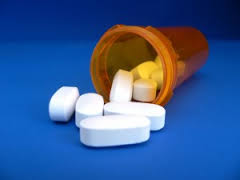 Now that you’re over 50, you may pay more attention to all the things that will keep you healthy, as you get older. These include eating right, exercising regularly, getting enough sleep, trying to keep stress at a minimum. Even though you’re doing all these things already, you could still be deficient in 4 critical vitamins (and others) – especially if you take certain prescription drugs.
Now that you’re over 50, you may pay more attention to all the things that will keep you healthy, as you get older. These include eating right, exercising regularly, getting enough sleep, trying to keep stress at a minimum. Even though you’re doing all these things already, you could still be deficient in 4 critical vitamins (and others) – especially if you take certain prescription drugs.
Before I tell you about the 4 common vitamin deficiencies in older adults, let me share a simple secret with you. Click here to learn how to have perfect health, effortless weight loss, unlimited energy and happiness…plus how to live a longer life!
The 4 Common Vitamin Deficiencies in Older Adults
Even though you may be eating what you think is a healthy diet, you could still be deficient in some critical vitamins that help ward off diseases associated with getting older. First, many people don’t know what good intake levels of vitamins are; they rely on the amount listed on their multivitamin to do the job. In many high quality multivitamins, this would be enough. However, there are other commercial brands out there that only provide the minimum RDA – this is the least amount that you need for functioning, but, it’s not the optimal level. In fact, researchers are now looking at how certain chronic vitamin and mineral deficiencies lead to age-related diseases and how determining these deficiencies early on can help prevent them.
Second, if you take certain prescription drugs (see below), they can cause absorption problems with some vitamins and minerals. You wind up deficient in them and body systems may be put at greater risk. Below, I’m going to tell you what these 4 critical vitamins are and what medications you may be taking that might impair their absorption.
1. B9 (folate, folic acid). This is a very important vitamin in which many older people could be deficient. It especially helps prevent cardiovascular disease as it neutralizes a protein called homocysteine, which can build up and lead to heart attacks and strokes. It also has a role in preventing cancer. Some symptoms of deficiency can be inflammation of the tongue, diarrhea, and undue fatigue. It can be determined by a blood test. Good sources of B9 are folic acid fortified foods like orange juice and many whole grain cereals. Good natural sources include beef liver and spinach. Adult requirement of B9 is 400-800 mcg a day. If you take the drug Pentamidine, an antimicrobial, you could develop a deficiency in B9. Anti-cancer, and anti-seizure drugs may result in malabsorption of B9. Check with your doctor for deficiencies.
2. B12. This vitamin is crucial for energy metabolism, nervous system function and memory. After age 30, many people lose the ability to absorb B12 adequately through their gut and deficiencies are common in elderly people. Can be determined by a simple blood test and remedied with oral supplements or monthly injections. If you take the drugs for gastric reflux disease (too much stomach acid) you may have a deficiency in B12. Adult requirement is 400 mcg a day.
3. Vitamin C. Many older people don’t eat as much citrus fruits as they need. Vitamin C is a high-use antioxidant that many body systems rely on for good function. It is one of the major free radical fighters that helps prevent cellular DNA damage. Deficiencies can result in poor wound healing, anemia, gum disease, depression, fatigue, perhaps even cancer. So getting enough is crucial. Adult requirement is 200 mg a day, but the Linus Pauling Institute recommends 400 mg as being more helpful in older people. Over-50 adults are fighting greater oxidative damage from free radicals on a daily basis and can help prevent cardiovascular disease, stroke, and cataracts.
4. Vitamin D. An immune system booster and antioxidant, Vitamin D helps many body systems function correctly. Specifically, bones, brain, muscle strength are supported by Vitamin D. Yet, older people frequently lose some of their capacity to absorb Vitamin D through their skin in sunlight. Supplementing with Vitamin D, through fortified foods, or supplements helps. Recent research studies show that 2,000 IU per day may help older adults ward off diseases like breast, ovarian and colon cancers. Anti-seizure drugs, cholestyramine, mineral oil, and the obesity drug Orlistat can cause a malabsorption of Vitamin D. If you take laxative drugs, you could also have deficiencies in Vitamin D. Can be checked by a simple 25-hydroxy D blood test.
Researchers also point to possible deficiencies in B1, beta carotene, Vitamin E, Vitamin K, iodine and selenium in older people. Medications that can impact these include antacids, antibiotics, and diuretics (high blood pressure pills).
It’s most important that you get enough of the 4 critical vitamins noted above as well as supporting vitamins and minerals. Be sure your multivitamin supplement contains enough and also consider what levels you’re getting from the foods you eat. Read labels and ask your doctor if the drugs you’re taking could be contributing to deficiencies that could put you at risk for age-related diseases in the future.
Stay Well,
Ron Blankstein, M.D.
http://womenshealth.gov/publications/our-publications/fact-sheet/folic-acid.cfm
http://lpi.oregonstate.edu/fw08/olderadults.html
